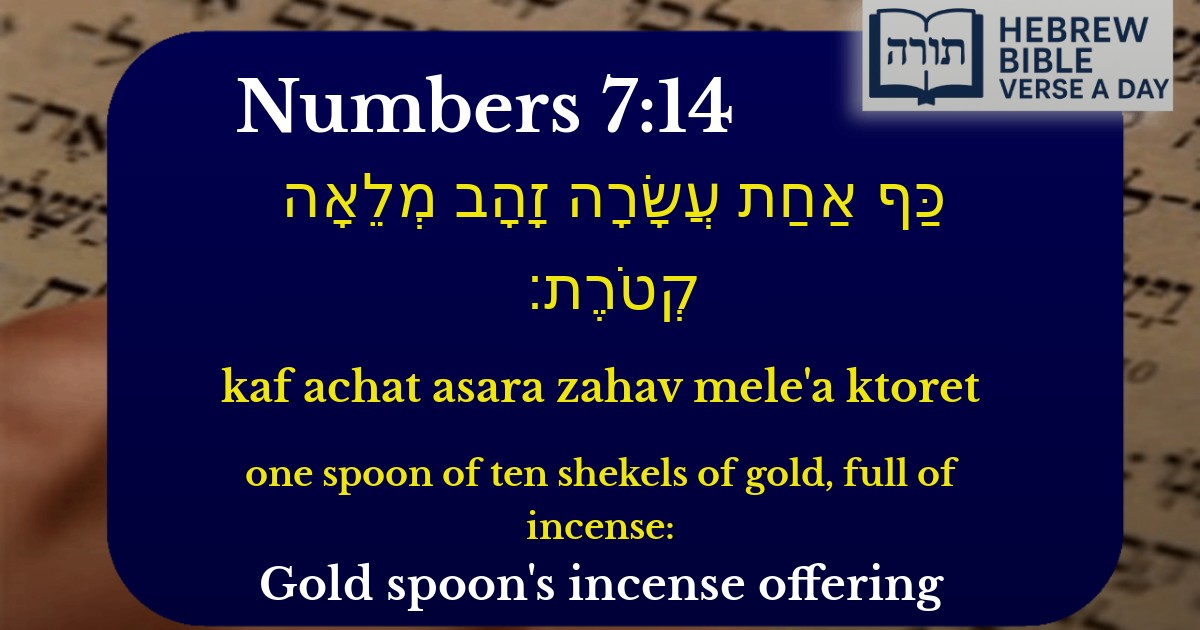Frequently Asked Questions
Q: What does the 'spoon of ten shekels of gold, full of incense' represent in Numbers 7:14?
A: This verse describes one of the gifts brought by the tribal leaders for the dedication of the Mishkan (Tabernacle). According to Rashi, the golden spoon (kaff) and incense symbolize the importance of sincere prayer and service to Hashem, as incense represents the prayers of the Jewish people ascending to heaven (see Talmud, Berachot 43b).
Q: Why was the spoon made of gold in this verse?
A: Gold represents purity and holiness in Jewish tradition. The spoon was made of gold to signify the elevated nature of the service in the Mishkan. The Rambam (Hilchot Klei HaMikdash 1:2) explains that vessels used in divine service must be made from noble materials to honor the sacred work.
Q: What is the significance of the incense mentioned in Numbers 7:14?
A: Incense (ketoret) in the Torah represents the spiritual connection between the Jewish people and Hashem. The Talmud (Keritot 6b) teaches that the ketoret had a special formula of 11 spices and was offered daily in the Mishkan (and later the Temple). It symbolizes unity and atonement, as the Midrash (Bamidbar Rabbah 13:6) states that the incense brought harmony between Israel and their Father in Heaven.
Q: How does the offering in Numbers 7:14 apply to us today without the Temple?
A: Although we no longer bring physical offerings, our Sages teach that prayer has replaced the Temple service (Talmud, Berachot 26b). The golden spoon of incense reminds us to approach prayer with the same dedication, purity, and heartfelt intention as the original offerings. The Chofetz Chaim (in his commentary on the Torah) emphasizes that our words of Torah and tefillah today are like the ketoret ascending to Shamayim (heaven).
Q: Why specifically 'ten shekels' of gold for the spoon?
A: The number ten holds great significance in Judaism, representing completeness and divine order (as seen in the Ten Commandments and Ten Sefirot). The Midrash (Bamidbar Rabbah 13:14) connects this to the ten tests of Avraham or the ten utterances of Creation. The exact weight teaches precision in serving Hashem - every detail in avodah (divine service) matters, as later codified in the halachic measurements for Temple vessels (see Rambam, Hilchot Klei HaMikdash 2:3-4).


The Significance of the Golden Spoon (כַּף זָהָב)
The verse describes a golden spoon (כַּף זָהָב) weighing ten shekels, filled with incense (קְטֹרֶת). Rashi (Bamidbar 7:14) explains that this was one of the offerings brought by the tribal leaders (נשיאים) during the dedication of the Mishkan. The spoon was used to hold the ketoret, a sacred incense offering, symbolizing the spiritual elevation of the Jewish people.
The Weight of Ten Shekels
The specification of "ten shekels of gold" carries deeper meaning. The Ramban (Bamidbar 7:14) notes that the number ten alludes to the Ten Commandments, representing the foundation of Torah and divine service. Additionally, the Midrash Tanchuma (Naso 12) connects it to the ten utterances through which the world was created, emphasizing that proper worship sustains creation.
The Incense (קְטֹרֶת) and Its Symbolism
The ketoret was a unique offering with profound spiritual significance. The Talmud (Keritot 6b) teaches that the ketoret atones for lashon hara (evil speech), as its rising smoke symbolizes the elevation of speech toward holiness. The Zohar (Vayikra 16a) further explains that the ketoret represents unity among the Jewish people, as its blend of eleven spices mirrors the harmony of diverse souls serving Hashem together.
Practical Lessons from the Golden Spoon